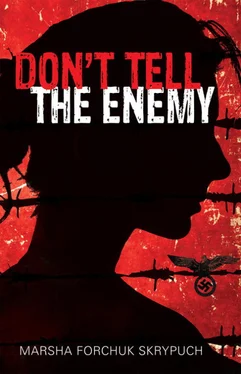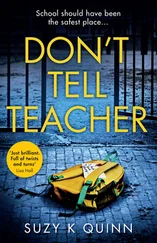“Thank God they got out of this area safely,” said Mr. Segal.
“That’s why I came here as soon as I heard,” said Uncle Ivan, standing up. “But I must be on my way.” He enveloped Mama in a firm hug. “Stay safe, sister,” he said. And then he was gone.
Chapter Twenty-Five
Holy Days
The Commandant had a nasty way of timing Aktions to Jewish holy days, but the next trains to Belzec left on October 30th, which was not a holy day. Again, Mama and I went to the square to witness who was taken, and again Doctor Mina was spared.
The next Aktion was during Chanukah in December. The ghetto was emptied of all of its remaining inhabitants. The police tore down walls and set fire to buildings, ensuring that every single soul still remaining in the ghetto was taken. The Judenrat was not spared. Doctor Mina was also not spared.
She was thin and haggard, but she walked to the train with her head held high. Her eyes searched the crowd, and when she saw me I nodded slightly, hoping to let her know that her sons were safe. She nodded back ever so slightly — enough for me to see, but imperceptible to the police who were nudging her forward.
I stood and watched as the train doors were closed and bolted from the outside. As it chugged past me, my knees gave out and I fell to the ground. Anger, helplessness, sorrow, frustration… a wave of emotions washed over me. Doctor Mina had devoted her life to helping others. Why did she have to die?
Strong hands gripped mine and pulled me to my feet. “You’d best be getting home, Fräulein Krystia,” said a familiar voice. I looked up. The blacksmith, Herr Zimmer.
“Thank you,” I said, brushing the dirt off my clothing. Then I ran back home.
Leon knew as soon as he saw my face that his mother had been taken to Belzec. “Are we… Are we the only Jews left in Viteretz?” he asked.
“There may be others hidden too,” said Mama. “But I’m afraid there can’t be many still alive.”
Leon sat down heavily on a kitchen chair and cradled his head in his arms. His entire body shook with his silent weeping. Dolik sat beside his brother, but he was silent too. He stared straight ahead with a pale face; his eyes were dry. I got out a piece of paper and pencils, then sat down with them, but kept my silence.
There were no words that could possibly bring comfort to Dolik or Leon on such a horrible day. I sketched an outline of Dolik, and beside him, Leon. On one side of the boys I drew Mr. Kitai, and on the other, I outlined Doctor Mina. Behind them, I drew the house that they’d lived in for so long.
Dolik noticed what I was doing and he tugged the paper over and took the pencil from my hand. Wordlessly, he continued to add more detail. We passed it back and forth in silence for hours.
* * *
After Doctor Mina was taken to Belzec, the five of us continued to share dinner each evening, and we’d talk in whispers and pass the time playing Remi and drawing portraits on paper, but the shadow of death was never too far away.
One evening, just after our friends had come up from under the floor, there was a knock on the door.
“Hide in the bedroom,” whispered Mama.
They darted out of the kitchen and softly closed the bedroom door behind them. I looked frantically around and noticed that the stove was slightly askew, so I quickly pushed it back into place as Mama opened the door. Just then I realized that there were five places set on the table. It was too late to hide the three extra plates.
Herr Zimmer stepped in, holding an empty mug.
“Frau Fediuk,” he said, with a slight bow to Mama, “I’m sorry for bothering you in the evening like this, but could you spare a mug of milk?”
“Certainly,” said Mama, taking his mug. As she walked to the counter to fill it up, I stood in front of the kitchen table, hoping to block Herr Zimmer’s view of the place settings.
As Mama handed the mug back, I saw that her hands were shaking.
He took the mug from her and smiled. “Thank you,” he said. “How much do I owe you?”
“Nothing,” said Mama. “We are neighbours, after all.”
“Indeed,” he said. “It is our duty to watch out for our neighbours.” He bowed again and backed out the door.
After he was gone, Mama collapsed onto a chair. “Do you think he saw the plates?”
“I’m not sure,” I said.
But if he did, nothing came of it. The next weeks were some of the happiest times of my life.
And then in March 1943, our world fell apart.
Mama was at the pump getting water and I was at home peeling potatoes for supper. The door burst open and Commandant Hermann himself stepped in, his Luger drawn. Behind him was an armed policeman.
“You have a Jew hidden here!” he said to me. “Give him up now and I won’t punish you.”
“I don’t have a Jew here,” I told him in what I hoped was a sincere-sounding voice. It wasn’t a lie: we had three, not one. But as I said the words, even to me they weren’t convincing.
“Officer Weber, check that room,” said the Commandant, jerking his head towards the bedroom.
From the open door I watched the policeman rip apart our feather mattresses, pillows and comforters, then flip our beds onto their sides to look underneath. He came out of the bedroom, leaving destruction behind him, trailing a cloud of feathers. “There is no one back there, Herr Commandant,” he said.
“Then go outside and check the shed, the outhouse and the root cellar.”
Officer Weber hurried to obey as the Commandant planted his black leather boots on the dirt floor and glared at me with cold blue eyes. A vein in his forehead throbbed. He removed one leather glove and shook it in front of my face. “Tell me now where this Jew is!”
“We aren’t hiding a Jew.”
He slapped me hard across the face with his glove. I gasped and he did it once more.
“There is no Jew here,” I said again. He could kill me and I still would not tell him.
He punched me hard in the stomach and I doubled over. Mama burst through the door and tried to push him away from me.
The Commandant turned to her. “ You! ” he said. “I give you a safe job, and in return you hide Michael Segal? That Jew ran a counterfeit document ring in the ghetto.” He raised his Luger towards Mama’s face. “ Where is he? ”
Mama stood there. Silent like me.
Officer Weber returned. “Nothing,” he said. “There must be a false wall or floor somewhere in here.”
The Commandant said to me, “Bring me an axe.”
We did have an axe in the shed, but I would not bring it to him. I was too frightened to respond. I stood as if glued to the floor.
Officer Weber must have seen the axe in our shed, because he hurried out and a few moments later came back with it. He used the wooden handle to tap all over our wall, listening for a hollow sound, then he methodically did the same for the floor.
Mama and I stood together, our arms wrapped around each other, too horrified to breathe.
When Officer Weber got close to the metal plate under the wood stove, the hollow sound was distinct. He lifted the axe to cut through the metal, but the Commandant put his hand up. “Stop,” he said. “That will not work. It would be easier just to push the stove aside. That plate underneath is likely the entry to the hiding place.”
They pushed on the corner of the stove together and it moved. The Commandant took the axe from Officer Weber and used it to lift up the metal plate.
Dolik stared out defiantly. Leon was hiding his face in his brother’s chest.
“These are two young people ,” said the Commandant. “The girl told us you had Michael Segal.”
Читать дальше



![Quiet Billie - Don't mistake the enemy [СИ]](/books/421973/quiet-billie-don-t-mistake-the-enemy-si-thumb.webp)








